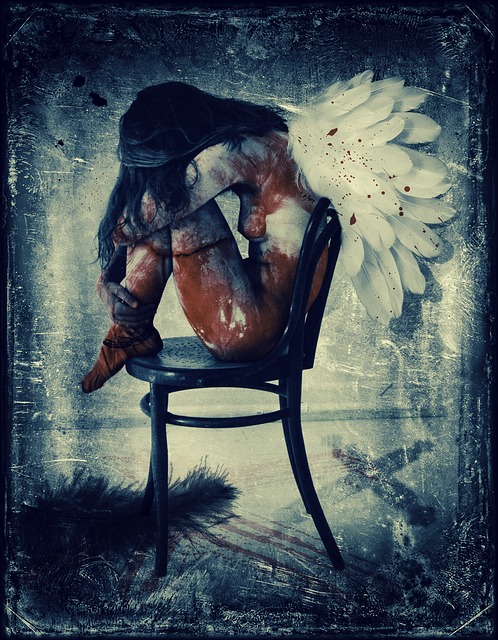When spirituality and religion enter the ring, it can feel like you are in a fight for what to believe in.
Whether you were raised in a traditional religious home or you rebelled against labels that defined you, the search for truth always seems to end in a battle to identify who’s right and who’s wrong.
But what if your search wasn’t about proving what is right or wrong externally, but about internally discovering how you feel more connected to the divine?
Discovering this connection within provided me with something my religion could not—and it wasn’t about being boastful or egotistical. It was about an intimate relationship with a god that did not find me guilty of all charges.
I was tired of running away from the hellfire that was sure to be my destination 50 percent of the time on a good day. Sin seemed to always know my address and came knocking at my door, begging me to come and play like a childhood friend. After the fun, the guilt that followed always felt worse than the sin itself.
My religion taught me that I was flawed and needed fixing, but I found it ironic that my “mistakes” were often the catalyst that aided my growth.
Discovering this truth within myself led me on the road to enlightenment and steered me away from negative emotions like self judgement, guilt, and shame. How often do people change for the better by doing the right things? My guess is not as often as we’d like to think. Mistakes mixed with a bit of pain are usually the perfect elixir that catalyzes growth and transforms you into the person God designed you to be.
My journey toward spirituality began with a lot of reading. I remember being in college and spending long nights scouring spiritual texts never mentioned in church. Not only did I question the validity of these texts, but also if I should be reading them. Should I take my spiritual knowledge from anything other than the Bible?
Coming from the old school Pentecostal Christian background that I experienced in my childhood and teenage years, this was surely blasphemy and might have even landed me a one-way ticket to hell. However, I was beginning to feel more empowered, more loved, and more at peace with the new information I was discovering.
I remember my father sharing some wisdom with me, saying that, “The kingdom of God is within you and all around you.” Eventually I came across The Gospel of Thomas and was surprised to find that there were gospels written besides the four canonical gospels of the Bible. Although controversial, The Gospel of Thomas was a gateway to many other texts from a variety of sources which led me to live a more enlightened life.
So, what exactly is enlightenment? To me, enlightenment is like discovering an old family album. Inside there are photos of you as a baby with family members and old friends. Although you may not remember every birthday, holiday, or family gathering, there is no doubt in your mind that the person in the photo is you. That it is your smile and those are your eyes.
Enlightenment is similar to this in that it is the conscious remembering of who you are at the core and your connection to the divine. How you remember is your spiritual identity.
There is no right or wrong way to be spiritual because everything is a manifestation of spirit or God in some form. It is 100 percent possible to find spirituality through a creative outlet such as music, art, or dance, and your spiritual identity can absolutely be crafted out of something you already enjoy doing.
My spiritual identity is eclectic. The ways in which I feel connected to God are at times atypical. I can sit in a forest, look around, and see God in every tree, bird, and insect. I can listen to a rap song and feel a connection to God through the lyrics and the beat. Despite what most people say, I even believe that science could be a major way a person can connect to spirit. In fact, when I often read up on the latest science discoveries or theories, I can’t help but connect all the information back to spirit.
Being spiritual does not require a specific text, temple, or religious affiliation, but it does require a certain level of awareness or consciousness and a desire to view life through a spiritual lens.
You may wonder, “Why is spiritual identity so important?” Well, do you consider your birth parents to be an important influence on who you’ve become? What about your race, gender, or nationality? Now I know there is a new phenomenon in our culture to transcend these labels, but at the very least they give you something to transcend.
If you are going to put any level of importance on your physical identity, you must also consider your spiritual identity. Walking around without being aware of your spiritual identity is akin to being a Jane or John Doe in society. In a similar sense, it’s not that you don’t have a connection to the divine, it’s that a lot of the times you don’t remember this connection.
What I’m learning is that it’s not about striving to be perfect or judging who’s right or wrong in society, it’s about being aware enough to recognize that your life is a sermon and you are the preacher. Instead of trying to live someone else’s religious or spiritual experience, place yourself under the microscope.
Figure out what best connects you to your spiritual self. Create your own unique, spiritual pathway of enlightenment, for you are your greatest point of access to the divine. Everything else is simply a guide.
~
Author: Kamaria G. Powell
Image: Pixaby
Editor: Lieselle Davidson


 Share on bsky
Share on bsky





Read 0 comments and reply